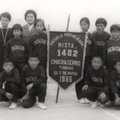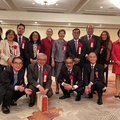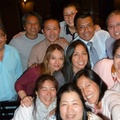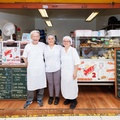José Iraha Flores is twenty-three years old and studies communications in the University of Lima. José Bravo Kohatsu is twenty-six and works in the Japanese consulate. Both are children of dekasegi1 who were born in Peru but raised and educated in Japan where they learned Japanese. Why did they return to Peru? Do they miss Japan? We wil explore these and other questions with them.
You went to Japan as young children and were educated there. Afterwards you returned to Peru. Why did you decide to make your lives here?
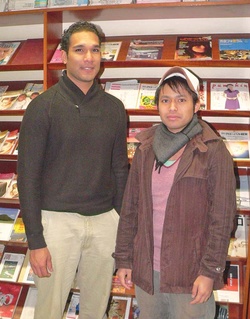
José Iraha Flores y José Bravo Kohatsu, jóvenes nikkei peruanos que se criaron y estudiaron en Japón, donde sus padres migraron para trabajar y buscar oportunidaddes. Ambos están de vuelta en lima, redescubriendo su identidad.
José Bravo Kohatus: I went to Japan when I was eight years old. I went to elementary school and junior high school there; I even attended high school for two years. I returned to Peru to learn Spanish because I only knew how to speak Japanese. I never even spoke Spanish with my parents once I learned Japanese. Aside from that, I wanted to learn Spanish and use it as a tool to find work. For that reason I decided to return to Peru for awhile. My idea was to stay for a year or perhaps a bit more than a year, but now I have been here for five years, and I think that I will spend even more time in Peru.
José Iraha Flores: In my case the inverse happened. I went to Peru with the idea of staying permanently. When I went to Japan at nine years old, I was already planning to return. I went with my parents so that they could work for a few years and then we would return. Ever since I left Peru, therefore, I was always in the state of mind of returning to Lima to study. When I finished junior high school in Japan I was more or less ready to return and readapt myself to Peruvian society and enroll in the university.
Since your return to Peru, have you ever thought of returning to Japan?
JIF: To make a life there, I don’t believe so. Suddenly—I believe this happens often to Nikkei who have the option of returning to Japan in order to make okane2—in the oft chance that things don’t work out well, to go, to make okane and return, but evidently a career as a source of support. Depending on the job that you find, if it is one that doesn’t allow me to have the kind of life that most people have in Nihon3, which revolves around employment in a company. It is due to the monotony that I feel this urge not to return to Japan.
Even though you haven’t decided what to do in the future, is it probable that you’ll return to Japan and stay there?
JBK: Let’s see, it would be a possibility because my parents are still there; my friends too. But it’s also a question of employment; if my job isn’t going well here in Peru, it becomes an option for me to return to Japan. The job that I have now, however, makes it a bit difficult for me to return because it provides me stability here.
What is it that most keeps you in Peru? Why have you stayed five years when you only planned to stay one?
JBK: Perhaps it is the Nikkei community. In Japan I was in Fukuoka, and I didn’t know many foreigners; foreigners, for me, were my family. My father knew other Latinos, but they lived in other areas of Japan. I didn’t maintain any contact with them, but upon my return to Peru, I was able to meet many people who had gone to Japan and then returned. I had heard that there was a Nikkei community in Peru, but I didn’t know much else. But my life here is something different. I am accustomed to life here in Peru; I have no problema staying here because I feel confortable. It has more to do with the people whom I know, however.
Both of you have parents and siblings in Japan. How do you handle this?
JBK: I don’t talk much to my brother even though we are not fighting. It’s different here because siblings, families are more united. My brother and I talk to each other about routine things but nothing else. I do miss my parents, but we have always lived apart. I lived with my parents during the first three or four years [but then] they went to the United States [for some time] and [then] returned but then [left again and] went to Japan. Between the ages of four and eight I didn’t live with my parents. Going to Japan until kōkō4, yes, I was living with my parents, but they worked all day, and I was playing soccer, so the time we had together was only for an hour or two. And since I didn’t speak Spanish, we were together but didn’t have many deep conversations.
They didn’t speak Japanese.
JBK: No, my mother learned a little, but my father, even now, does not speak Japanese. Now it’s normal, but at that time it was difficult for us to communicate. I communicated with my mother through an intermediary, or directly with her. Upon finishing kōkō I went to live in Kanagawa and only returned during vacation time, which lasted about two months, but I only returned [home] for a week, and even then, it was to see my friends rather than my parents (he laughs). Being here, yes, I miss them, but perhaps not like the families here. If we are together, that’s great, but if not, well, each one has his or her own life.
You learned to speak Spanish in Peru. Paradoxically, therefore, you can now communicate better with your father than when you were in Japan with him.
JBK: Yes, of course. At times when I call them, when they call me, now we comunícate just fine in Spanish, we even joke around. My mother and I wrote letters to each other, although I didn’t keep up the letter writing as much as she did, using my job as an excuse because I was busy (he laughs).
JIF: Letters or e-mail?
JBK: Letters. We began to write when I arrived here. My parents don’t use the Internet, only the phone. Each year my mother and I would write each other, but she also worked and kept busy and was tired, which means we wrote about two or three times a year. But we continue to write ever since I arrived in Peru.
And in your case?
JIF: In my case, it is enough to say that it is a question of tradition. Put another way, I had no other choice. The first time that my parents went to Japan, they left me for five or six years; we are talking about the first years that my folks went to Japan. Technology wasn’t so advanced that we could communicate with each other.
There wasn’t the Internet.
JIF: And it was very expensive to use the telephone. We tried to call as much as possible, but it was only once every three weeks or once every month. Yes, we kept in touch, but suddenly when one is a young child there are many distractions that, in truth, you don’t feel it as much. In other words, you have your cousins, friends, grandparents; I didn’t have a father or mother figure in my life, but yes, I had people who could fill in the emptiness. Back when I was with my parents in Japan, it was a drastic change for me at such an age, and I adapted to Japanese customs, that the father-son or mother-son relationship wasn’t so close. Paradoxically, it was being apart for so long that brought these relationships closer. A day doesn’t go by that I don’t send an e-mail to my dad, a little less with my mom because she doesn’t do well with technology, but we are always in contact.
Both of you have been with your respective parents for only short periods of time. How much has this affected you?
JBK: For me, I would put it this way: it’s life. The way that I am today I owe to my parents despite the distance, despite the fact that I only lived with them for a short time, despite not having a family like that of my friends, which made me jealous at times [of not being part of] a family, that we stick together to face whatever [challenge] but I am very grateful to my parents.
JIF: The normal thing to do is to create what is suitable [which] is having been [or having been able to spend] all the time with them [the parents]. Nevertheless, I also assume that we were not together because [my parents] knew that [if they had stayed] here, they would not have been able to give me what they wanted to give me. In fact, this affected me but in a positive way, in two aspects: If my parents had not gone to Nihon they would not have been able to pay for my university education.
On the other hand, it helped me so much to mature because you have to mature at an incredible rate. At eighteen they left my fifteen year old sister with me. And not only that, even before to hear that your parents are there [in Japan] working to give you things, it makes you want to study; one way or another it makes you realize that you have to respond to what your parents are doing. You develop, therefore, a sense of responsibility; those things that happen to you a long the way help you to mature. And like I told you, they left my sister with me when she was fifteen and I was eighteen, you are talking about a person who is just beginning to mature in theory, a person living at a critical age, so you have to react like an adult rather than a brother, that you both have to face each other because you both are still kids. You have to put aside child-like thinking and instead think like an adult.
You were responsible for her.
JIF: I was responsible for her. I was responsible for keeping on top of things, for punishing her—I never really did [punish her] because I would punish her and then take it back (laughing). I had to see myself as the father-figure. This really makes you mature fast.
Did the same thing happen to you? Did the absence of your parents also make you more mature and responsible?
JBK: It’s a similar story. Not being with your parents means that you have to be responsible for many things. Our parents lived too far away [in order to] provide for us, and with that as a point of departure, we always thought: my parents are working to give us something and we have to respond to that. If they were closer to us, perhaps our responsibility would be different. We would not have thought about it in those terms if our parents weren’t far away. When they are close, they are always going to be by our side, perhaps helping us but when they are far away, no, they are not here, we have to do our part and be more responsible. This is something that has made us mature faster.
JIF: What happens is that you value their sacrifice of being so far away in order to do something for yourself. What I am understanding from him is that being here, ok, they are working to give you something better, but what is it that they have to do, it is obvious, then all of a sudden you don’t value it. The most logical thing is that my father works in order to give me what I need. When they are far away, I see the other side of it: they are going far away, practically leaving their lives behind because they are leaving the place that pertains to them, in order to go someplace totally different. What you value most of all, therefore, is the sacrifice that they make by being so far away more than the fact that they are working.
Part 2 >>
Notes:
1. Dekasegi. Person who leaves his country of origin in order to work temporarily in another country. It applies to those Peruvians who work in Japan.
2. Okane. Money
3. Nihon. Japan.
4. Kōkō. School similar to junior high school.
* This article was made possible due to an agreement between the Japanese-Peruvian Association and the Discover Nikkei Project. It originally appeared in the journal Kaikan, Volume 48, August 2010.
© 2010 Asociación Peruano Japonesa y Enrique Higa Sakuda © Fotos: Asociación Peruano Japonesa



